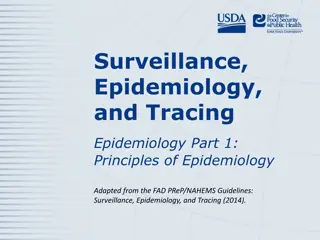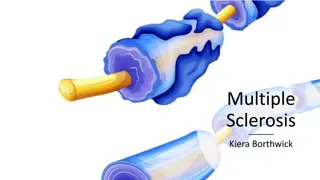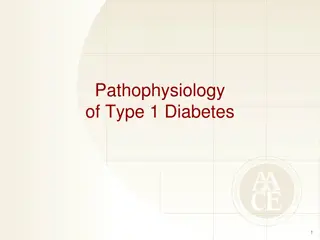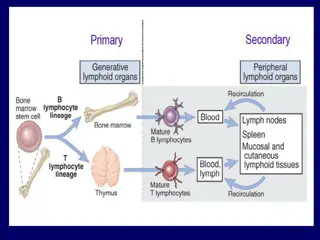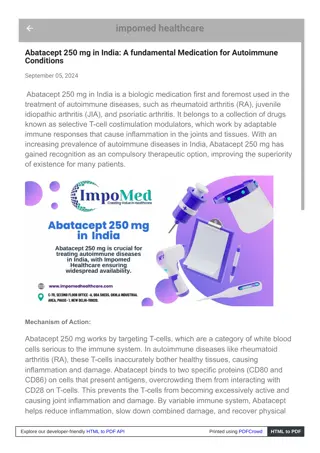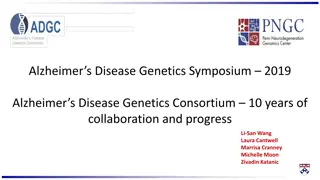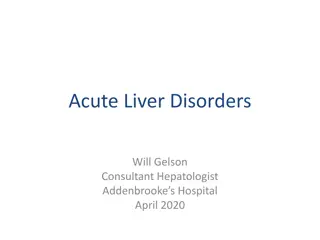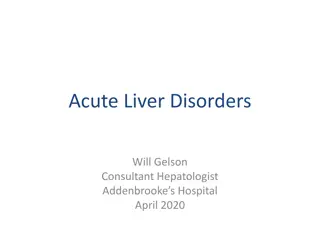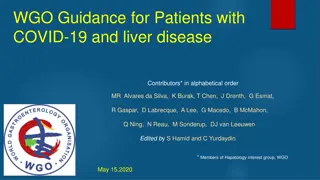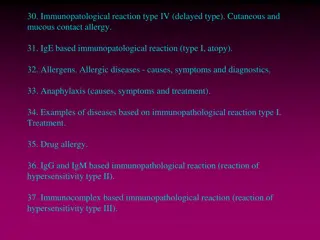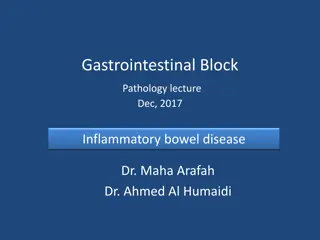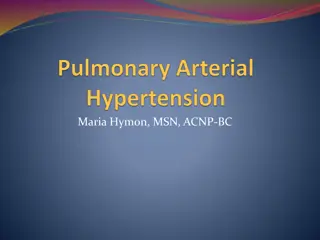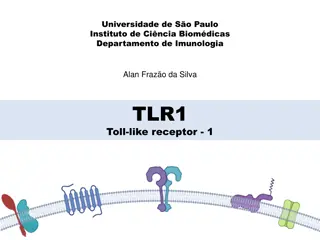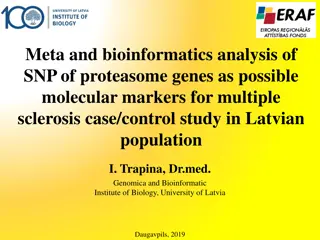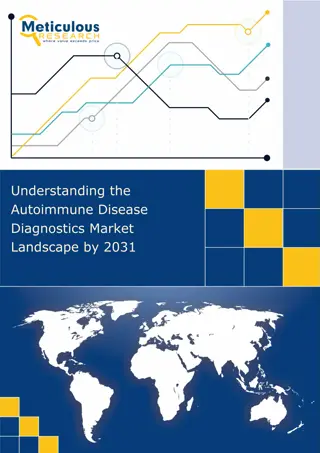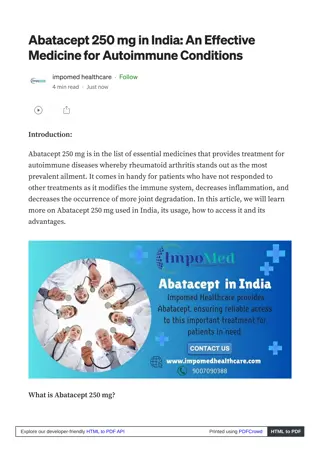Understanding Acute Rheumatic Fever: Causes, Symptoms, and Impact
Acute Rheumatic Fever (ARF) is a multisystem disease resulting from an autoimmune response to a sore throat caused by Group A beta-hemolytic Streptococci. It primarily affects children aged 5-14 years and can lead to rheumatic heart disease (RHD), which is the most common cause of heart disease in c
2 views • 48 slides
Understanding Immune Thrombocytopenia (ITP) and Its Impact
Immune Thrombocytopenia (ITP) is a rare autoimmune disease where the immune system wrongly attacks platelets, leading to low platelet count. It can affect individuals of all ages, with symptoms appearing post-virus, vaccination, or certain medications. ITP can result in fatigue, bruising, and bleedi
3 views • 30 slides
Understanding the Natural History of Disease Development and Prevention
The natural history of disease development outlines the progression of a disease in an individual without intervention, from exposure to outcome. Learning objectives include defining prevention terms, understanding disease severity, prevention levels, and intervention measures. Studying disease prog
4 views • 16 slides
Adhd Medication And Autoimmune Disease – trinexpharmacy.com
Adhd Medication And Autoimmune Disease is a common neurodevelopmental disorder that affects both children and adults. On the other hand, autoimmune diseases encompass a range of conditions where the immune system mistakenly attacks the body's own tissues. \nContact : 1 (747) 209 \u2013 3649\n\nE-ma
2 views • 7 slides
Principles of Epidemiology: Understanding Disease Occurrence and Surveillance
Epidemiology is the study of disease patterns, factors influencing disease occurrence, and the core functions of surveillance, field investigation, and analytic studies. It involves understanding disease characteristics, natural history, and evaluating the effectiveness of activities to mitigate dis
1 views • 25 slides
Understanding Graft-Versus-Host Disease (GVHD) and Its Symptoms
Graft-versus-host disease (GVHD) is a potential complication following stem cell or bone marrow transplants, where donor cells attack the recipient's body. GVHD can occur in acute or chronic forms, presenting symptoms such as abdominal issues, skin rash, dryness, joint pain, and more. This autoimmun
0 views • 13 slides
Insights into Tyzzer's Disease: An Overview of a Bacterial Infection in Laboratory Animals
Tyzzer's disease is an acute bacterial infection affecting rodents and rabbits, caused by Clostridium piliforme. Discovered in 1917 by Ernest Tyzzer, the disease is characterized by necrotic lesions in the caecal mucosa, liver, and heart. Initially known as Bacillus piliformis, it was later renamed
2 views • 21 slides
Understanding Multiple Sclerosis: Symptoms, Progression, and Treatment Options
Explore the cellular processes, symptoms, disease progression, and treatment options associated with Multiple Sclerosis (MS). Discover how MS, an autoimmune disease, affects the nervous system leading to a range of symptoms. Learn about the clinical progression of MS and how the immune system causes
0 views • 12 slides
Understanding Disease Control and Prevention in Epidemiology
This article discusses disease control processes in epidemiology, including reducing disease incidence, duration, and transmission. It covers public policy interventions, elimination, eradication, and extinction of infectious agents. It also highlights preventable causes of disease and different lev
2 views • 10 slides
Understanding Autoimmunity and Autoimmune Disorders
Autoimmunity refers to the immune system's failure to recognize its own cells, leading to attacks on self-tissues. Autoimmune disorders encompass over 80 chronic illnesses where the immune system mistakenly targets organs. These disorders are poorly understood and recognized, impacting various organ
1 views • 20 slides
Understanding Type 1 Diabetes Pathophysiology and Etiology
Type 1 diabetes is characterized by absolute insulin deficiency, resulting from pancreatic beta cell destruction. It is prone to ketosis with a total deficit of circulating insulin, often due to autoimmune factors. The pathophysiology involves inflammation, immune-mediated cell destruction, and a ch
0 views • 13 slides
Opportunities for Undergraduates in Health Research Lab
The Mohan Research Lab offers undergraduates the chance to conduct impactful research that can be published, focusing on biomarkers and targets for autoimmune diseases and cancers. Led by an international team of researchers, the lab provides a collaborative environment for students to engage in cut
4 views • 12 slides
Immune Response Regulation and Autoimmunity Overview
The immune system maintains a balance through tolerance mechanisms to prevent autoimmunity. Central and peripheral tolerance play crucial roles in immune unresponsiveness to self-antigens. Failure in immune regulation can lead to autoimmune diseases like diabetes and lupus. Vaccination, discovered b
0 views • 18 slides
Integration of Ayurveda in Modern Medicine Clinical Practice
The integration of Ayurveda in modern medicine clinical practice is a growing field focusing on research in pathophysiology, physiology, biochemistry, and cell biology. Ayurveda is being applied to address conditions such as atherosclerosis, stroke, dementia, Parkinson's disease, autoimmune rheumato
0 views • 17 slides
Abatacept 250 mg in India: Effective Treatment for Autoimmune Diseases
This PDF explores how Abatacept 250 mg provides targeted relief for autoimmune conditions like rheumatoid arthritis, juvenile idiopathic arthritis, and psoriatic arthritis. Learn more about Abatacept 250 mg in India.
1 views • 4 slides
Understanding Hemolytic Anemia: Classification and Management
Hemolytic anemia encompasses various subtypes like autoimmune hemolytic anemia, with warm and cold antibodies, each requiring unique management strategies. Diagnosis involves specific investigations like the Coombs test. Treatment typically involves corticosteroids as first-line therapy, while secon
1 views • 23 slides
Oral Manifestations of Systemic Diseases in Dentistry
This content explores various systemic diseases and their oral manifestations relevant to dentistry. It covers associations between heart disease and periodontal disease, effects of chronic corticosteroid use on the pulmonary system, endocrine disorders like diabetes and thyroid issues, autoimmune d
1 views • 63 slides
Screening for Peripheral Vascular Disease in Patients with Coronary Artery Disease
Patients with coronary artery disease should be screened for peripheral vascular disease as it is a frequent integrator of global cardiovascular risk. The association of atherosclerosis in various arterial diseases highlights the importance of identifying multisite artery disease. The prevalence and
0 views • 23 slides
Health Benefits of Amaranth: A Nutritious Ancient Grain
Amaranth is a small ancient grain rich in antioxidants, high-quality protein, and dietary fiber. Consuming amaranth may help reduce the risk of heart disease, diabetes, cancer, and autoimmune diseases. It is gluten-free and a good source of essential amino acids, manganese, and vitamin C, making it
0 views • 9 slides
Human Disease Symptom Network: Understanding Disease Relationships Through Symptoms and Genes
The Human Disease Symptom Network (HSDN) is constructed using a large-scale medical bibliographic records database to form a network of human diseases based on symptom similarities. By integrating disease-gene associations and protein-protein interaction data, correlations between symptom similarity
0 views • 37 slides
Understanding Bacterial Diseases of Fish: Columnaris Disease Overview
Columnaris disease, also known as Saddleback disease, is a common bacterial infection in fish that is often brought about by poor handling and high stress levels. This disease manifests as tail and fin rot, leading to rapid fish mortality. The causative organism, Cytophaga (formerly Flexibacter), is
0 views • 21 slides
Understanding the Interplay of the Immune System and Endocrine Disorders
Explore the intricate mechanisms of immunological damage to endocrine glands, focusing on disorders like Graves disease, Hashimoto's thyroiditis, type I diabetes, and Addison's disease. Delve into the association of autoantibodies with pathogenic and diagnostic significance, uncovering the complexit
0 views • 33 slides
Effect of Efgartigimod on Humoral Vaccine Responses in Patients with Autoimmune Diseases
The study explores the impact of Efgartigimod, a Neonatal Fc Receptor blocker, on humoral vaccine responses in patients with autoimmune diseases. It discusses how immunosuppressive therapies used in autoimmune disorders may affect susceptibility to infections and impair vaccine immunogenicity, highl
0 views • 18 slides
Understanding Coeliac Disease and Modified Diets for a Healthier Lifestyle
Coeliac disease is an autoimmune condition that affects the body's ability to process gluten, leading to various symptoms like abdominal pain, fatigue, and nutrient deficiencies. Following a modified diet, such as a vegetarian or gluten-free diet, can help manage these symptoms and promote better he
0 views • 17 slides
Financial Impact of Cold Agglutinin Screen for Diagnosis of Cold Agglutinin Disease
Cold agglutinin disease, a rare form of autoimmune hemolytic anemia, accounts for 15% of AIHA cases. Implementing a cold agglutinin screen for diagnosis can have significant financial implications in healthcare costs. This condition is characterized by the presence of cold agglutinins, primarily IgM
0 views • 30 slides
Decoding Genetics: Insights from Alzheimer's Disease Symposium to Type 2 Diabetes Study
Explore the latest findings from the Alzheimer's Disease Genetics Symposium 2019 on disease mechanisms, drug targets, and genetic pathways. Dive into the progress made by the Alzheimer's Disease Genetics Consortium over the past decade. Transition to a Genome-Wide Association Study uncovering suscep
0 views • 42 slides
Principles and Management of Acute Liver Disorders by Consultant Hepatologist
This presentation discusses the principles, causes, presentations, management, and prognosis of acute liver disorders, with a focus on insult to the normal liver leading to liver injury, inflammation, and necrosis. It covers causes such as drugs, viruses, ischemia, autoimmune conditions, Budd-Chiari
0 views • 16 slides
Understanding Acute Liver Disorders: Causes, Presentations, and Management
Acute liver disorders can have various causes such as drugs, viruses, ischemia, autoimmune conditions, and more. The presentations of acute liver disease can include abnormal liver tests, jaundice, liver impairment, and even liver failure. Management involves removing and treating the underlying cau
0 views • 16 slides
Liver Disease Burden in Tower Hamlets
Dr. Somen Banerjee, Director of Public Health in London Borough Tower Hamlets, highlights the concerning liver disease mortality rates in the area, with high incidence of cirrhosis, cancer, and hepatitis B and C. The data reveals a significant burden of liver diseases such as Non-Alcoholic Fatty Liv
0 views • 18 slides
Guidance for Patients with COVID-19 and Liver Disease Overview
This guidance provides detailed information on COVID-19 and liver disease, covering topics such as COVID-19 overview, liver test abnormalities, co-morbidities, viral hepatitis B and C, metabolic dysfunction, autoimmune hepatitis, clinical care aspects, complications management, screening for HCC, an
0 views • 14 slides
Understanding Immunopathological Reactions and Autoimmune Diseases
Discover the classification of immunopathological reactions by Gell and Coombs, including Type I to IV reactions, with insights into allergic diseases, anaphylaxis, drug allergy, and autoimmune diseases like Graves' disease and Myasthenia gravis.
0 views • 51 slides
Understanding Inflammatory Bowel Disease: Crohn's Disease and Ulcerative Colitis
Inflammatory Bowel Disease (IBD) encompasses Crohn's disease (CD) and ulcerative colitis (UC), chronic conditions with immunologic basis. This article delves into the epidemiology, pathophysiology, and differences between CD and UC, highlighting clinical features, pathology, and complications like a
0 views • 42 slides
Understanding Pulmonary Arterial Hypertension (PAH): Causes, Symptoms, and Management
Pulmonary Arterial Hypertension (PAH) is a progressive disease characterized by increased blood pressure in the pulmonary artery, veins, or capillaries. This condition can lead to right ventricular failure and eventual death if left untreated. PAH can have various causes, including idiopathic factor
0 views • 49 slides
Ultrastructural Alterations of Renal Tissue in a Male Patient with Fabry's Disease
Fabry's disease is a rare X-linked lipid storage disorder characterized by deficient lysosomal alpha-galactosidase A activity. This condition primarily affects males, leading to chronic kidney disease and progression to end-stage renal disease. Kidney involvement is a critical aspect, and high doses
0 views • 24 slides
Understanding Ankylosing Spondylitis: Causes, Symptoms, and Pathogenesis
Ankylosing spondylitis (AS) is an inflammatory disorder that primarily affects the axial skeleton. The disease causes pain, stiffness, and decreased spinal mobility, and it can lead to disability and decreased quality of life. AS is an autoimmune disease with a complex pathogenesis involving interac
0 views • 32 slides
TLR1 - Toll-like Receptor-1 in Immunology Research at University of São Paulo
Alan Frazão da Silva from the Department of Immunology at the University of São Paulo's Institute of Biomedical Sciences is conducting research on TLR1, a Toll-like receptor involved in immune responses against gram-negative bacteria and autoimmune diseases like Type 1 Diabetes and Graves' disease
0 views • 5 slides
Analysis of Proteasome Gene SNPs as Molecular Markers for Multiple Sclerosis in Latvian Population
This study by I. Trapina aims to investigate the prevalence and functionality of SNPs in proteasome genes to assess their potential as molecular markers for multiple sclerosis in the Latvian population. Multiple sclerosis is an autoimmune disease affecting the central nervous system, and the role of
0 views • 13 slides
Autoimmune Disease Diagnostics Market
The autoimmune disease diagnostics market is set for robust growth, anticipated to reach $10.55 billion by 2031, thanks to increased investment in research and development for accurate diagnostic solutions.\n
1 views • 5 slides
Abatacept 250 mg in India: A Reliable Treatment for Autoimmune Diseases
Abatacept 250 mg in India is used to treat autoimmune diseases such as rheumatoid arthritis, juvenile idiopathic arthritis, and psoriatic arthritis. It reduces inflammation and joint pain, slowing disease progression. Abatacept 250 mg in India avail
0 views • 11 slides
Understanding Viral Pathogenesis: Causes and Consequences
Viral pathogenesis involves the process by which a virus leads to disease, exploring the interplay between viral and host factors. It encompasses the concepts of virulence, viral disease, and the effects on infected cells and the host's immune response. Changes within infected cells, including cell
0 views • 26 slides




